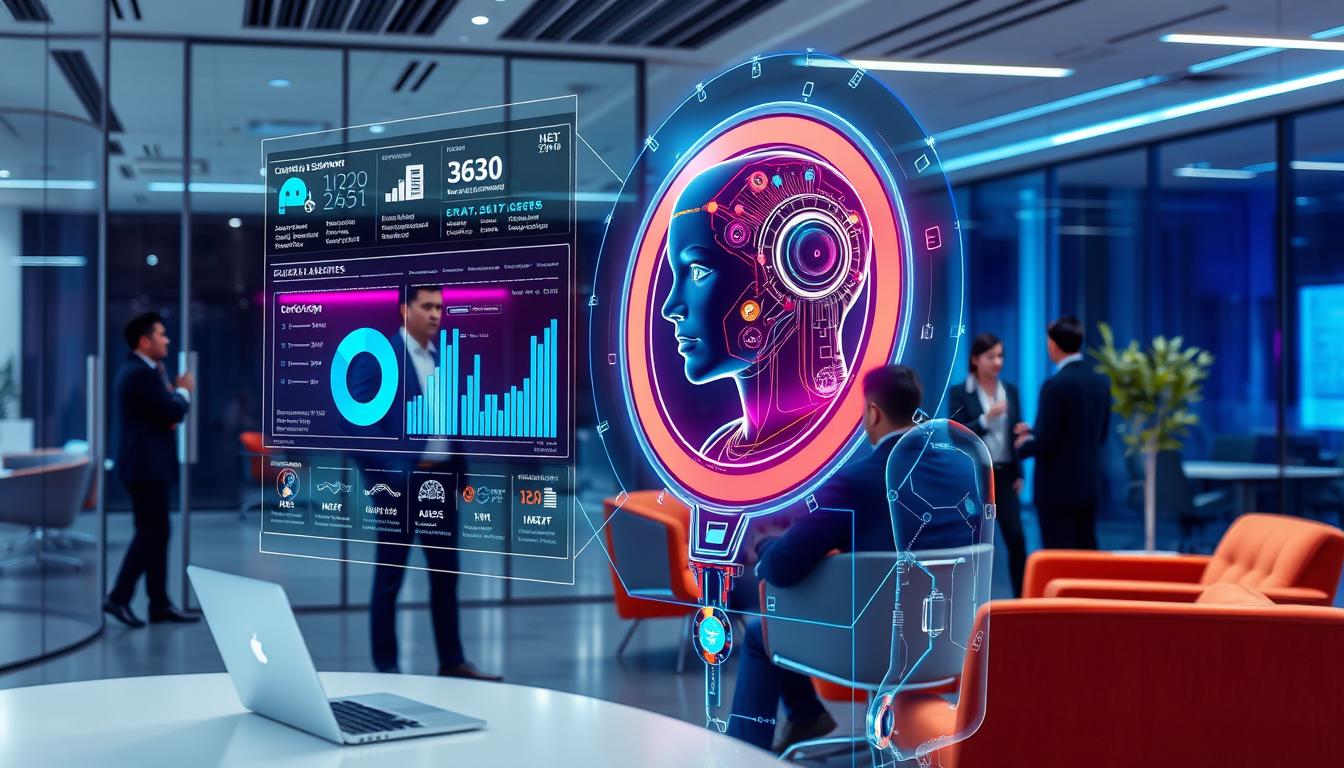Last Updated on December 9, 2025
In today’s fast-paced business world, AI Decision Making is key to reshaping managerial roles. As AI advances, companies are adopting these technologies to make smarter choices that boost productivity. Research indicates that 85% of business leaders are under pressure, dealing with a tenfold increase in daily decisions over the past three years. By embracing AI, leaders can bridge the data-insight gap and make more informed decisions. AI tools like virtual assistants and data analytics can elevate your role and propel the future of work.
Integrating AI into your decision-making can significantly alter your leadership approach. It brings speed, precision, and the ability to aggregate data. Yet, it’s vital to remember that AI can’t replace the unique human experiences that fuel innovative leadership.
Key Takeaways
- AI revolutionizes decision-making, reducing stress for managers.
- Understanding AI tools can enhance your leadership role.
- AI offers speed and precision that can transform workplace productivity.
- Human experience remains crucial despite AI’s capabilities.
- Business leaders are increasingly leaning on AI for daily decisions.
The Role of AI in Today’s Workplace
AI integration in today’s workplaces is more than a trend; it’s essential for boosting operational efficiency and driving innovation. As companies embrace AI, the way workplaces function is undergoing a significant transformation. AI streamlines processes, freeing employees to concentrate on strategic tasks rather than mundane administrative duties.
Understanding AI Integration in Business
AI is revolutionizing industries, prompting significant investments in technology. This year, global business spending on AI hit $50 billion, with forecasts suggesting it will soar to $110 billion by 2024. Retail and banking have already committed over $5 billion, demonstrating AI’s broad applicability. In healthcare, AI’s capabilities in data analysis and medical imaging underscore its critical role in improving service quality.
Current Trends in AI Adoption by Companies
There’s a clear shift towards AI as a primary force in workplace evolution. AI adoption is on the rise, with small businesses set to benefit from tools that dissect sales trends and offer financial insights. Generative AI platforms, such as ChatGPT, have quickly gained 100 million users in just 60 days. As companies tap into these trends, they seek AI solutions to refine strategies and enhance decision-making.
Benefits of AI-Informed Leadership
AI-informed leadership revolutionizes team management and decision-making. It leverages automation, predictive analytics, and natural language processing. These technologies boost operational efficiency and strategic decision-making. They allow for rapid data analysis, providing essential insights for effective leadership.
Enhancing Efficiency Through Automation
Automation frees your team from mundane tasks like data entry and invoicing. This shift significantly increases productivity, allowing your team to concentrate on strategic projects. AI systems help monitor employee performance and key indicators, offering a detailed view of your team’s success.
Predictive Analytics and Data-Driven Decisions
Predictive analytics is vital for guiding decisions on market trends and customer behavior. It helps forecast these elements, enabling adjustments to marketing and product development. AI tools like IBM Watson analyze both structured and unstructured data, providing actionable insights. These insights help minimize risks and maximize profits, leading to improved business outcomes.
Natural Language Processing: Improving Customer Insights
Natural language processing (NLP) enhances understanding of customer sentiment and automates service interactions. It allows for targeted content and responses that engage your audience, improving the customer experience. This capability ensures your decisions meet client needs and market demands.
AI Decision Making: Enhancing Managerial Effectiveness
The integration of AI decision making has revolutionized traditional managerial strategies. Today, businesses rely on data-driven insights, reshaping their decision-making processes. Machine learning algorithms delve into vast datasets, uncovering patterns and trends that guide strategic choices.
Transforming Decision-Making Processes
AI’s advancement has led to significant changes in how organizations operate. Starbucks, for instance, employs machine learning to optimize store layouts, enhancing customer satisfaction and operational efficiency. McDonald’s also uses AI to suggest drive-thru menu items based on time of day and customer preferences. These examples highlight AI’s role in streamlining decision-making processes across different sectors.
Machine Learning Algorithms for Better Outcomes
Netflix and Amazon showcase the impact of machine learning algorithms, offering personalized recommendations based on user behavior. This technology extends beyond retail; Facebook uses AI for content moderation, improving the quality of content on its platform. The widespread adoption of AI, with over half of organizations utilizing these technologies, highlights its critical role in enhancing managerial effectiveness. For more on AI in the workplace, visit AI in the workplace.
Challenges of Implementing AI in Management
As organizations seek to integrate AI into management, several challenges emerge. Algorithmic bias is a major concern, where AI systems may unintentionally perpetuate societal biases. This can result in unfair outcomes, especially in facial recognition systems that show lower accuracy for certain groups. It’s crucial to address these biases to foster ethical AI practices.
Concerns About Algorithmic Bias
Algorithmic bias impacts decision-making and raises ethical questions about AI fairness and accountability. Managers must be vigilant about bias risks and develop strategies to mitigate them. This could involve using diverse data sets, auditing AI algorithms regularly, and promoting transparency within the organization.
Ethical Considerations in AI Decision Making
Implementing ethical AI requires tackling complex challenges, such as adhering to regulations like GDPR and CCPA. These laws set strict guidelines for data use. It’s essential to ensure AI applications respect privacy and security while adding value. Moreover, AI tools are often costly and require significant workflow changes. Managers must clearly communicate the impact of these changes. Engaging employees in the design process can help overcome cultural resistance and facilitate a smoother transition to AI in management.

The Future of Job Roles: AI in Management
AI technology’s advancement is reshaping managerial roles in organizations. This change brings about new managerial specializations and shifts in responsibilities. It aligns more with strategic management. Executives will see evolving trends in job roles as they learn to use AI effectively.
New Managerial Specializations Emerges with AI
AI integration introduces unique managerial specializations. Roles like AI ethics officers, data curators, and AI project managers show this shift. These positions demand a deep understanding of technology’s impact and adherence to regulatory standards.
This evolution goes beyond adapting existing roles. It enhances value through strategic AI implementations.
Shifting from Administrative to Strategic Roles
The rise of AI accelerates a transition to strategic management positions. Managers will be more involved in high-level decision-making. This will influence the overall business direction.
Emphasizing critical thinking and adaptability will be crucial. You’ll need to embrace AI tools and methodologies. The focus will be on boosting productivity, innovation, and responsiveness in the dynamic business environment. This requires a fresh skill set tailored to these future roles.

The Importance of Training for AI Competence
AI technologies are transforming the workplace, making it crucial for organizations to focus on training. This effort is key to building AI competence among employees. It prepares teams for smooth integration with new technologies and bridges the growing skills gap. Ensuring your workforce is ready to use AI tools is now more important than ever.
Developing Skills for AI Integration
Maximizing AI benefits requires a focus on skills development. Adaptive learning platforms offer personalized learning paths, adjusting content based on individual progress and learning style. This approach keeps employees engaged and fosters continuous improvement. Such platforms provide adaptive feedback, refining skills and reinforcing strengths, boosting overall performance.
Addressing the Skills Gap in the Workplace
AI analytics can identify training needs and skill gaps, enabling targeted training programs. Predictive analytics help tailor training to meet workforce demands. AI-driven features like gamification and chatbots make learning more enjoyable. This creates a culture of continuous learning, reducing the skills gap and preparing your team for future challenges.
How Leaders Can Leverage AI Tools Effectively
Leaders must adopt a structured approach to fully utilize AI tools. A strategic framework for AI implementation is essential for integrating AI into business operations. With proper planning, teams can unlock AI’s full potential for leadership and collaboration.
Strategic Framework for AI Implementation
Developing an AI implementation framework involves several critical steps:
- Budget Allocation: Determine financial resources for AI projects to ensure long-term viability.
- Talent Acquisition: Recruit data analysts and AI engineers to drive AI initiatives.
- Stakeholder Engagement: Engage with key stakeholders to gain support across departments.
AI tools can automate tasks, like resume screening in talent acquisition. This boosts efficiency and minimizes hiring bias. Platforms like HireVue and Textio use AI to enhance recruitment, highlighting the need for a solid implementation framework.
Collaborating and Partnering for Success
Collaboration is crucial for AI success. Working with technology vendors, experts, and research institutions offers insights into AI trends. Such partnerships help understand AI’s potential and address ethical concerns, ensuring transparency and data privacy.
AI-powered communication tools, such as Slack and Microsoft Teams, improve teamwork. They automate messaging and provide analytics on team interactions. This enhances engagement, supports collaboration, and streamlines AI efforts across departments.
The Impact of AI on Employee Roles and Responsibilities
The rise of AI is reshaping the workplace, altering employee roles profoundly. Entry-level jobs are seeing a significant transformation, moving from basic tasks to more complex duties that involve AI. Understanding these changes is crucial for preparing for future challenges and opportunities.
How AI Will Redefine Entry-Level Positions
AI’s influence is most evident in entry-level roles, where the emphasis is on developing analytical and decision-making abilities. Workers in these positions now interact with AI tools that automate routine tasks. This allows them to focus on more strategic and creative work. Studies show that generative AI can handle a large portion of entry-level tasks, redefining these roles. This shift brings new responsibilities that promote skill growth and adaptability.
Building Human-AI Collaborative Teams
Effective human-AI collaboration is key to boosting productivity in today’s workplaces. These teams combine human creativity with AI’s analytical power to enhance efficiency and innovation. Building such teams requires continuous training and support, enabling employees to effectively integrate AI into their work. Companies are increasingly prioritizing environments where human-AI partnerships flourish, ensuring worker empowerment is central to AI initiatives. For those looking to bridge the skills gap, exploring training options can be beneficial.
Conclusion
AI decision making is poised to revolutionize management across various sectors. With 79% of corporate strategists highlighting AI, automation, and analytics as crucial for success in the next two years, embracing AI transformation is imperative. AI can process vast data and offer real-time insights, enhancing operational efficiency through informed decision-making.
Integrating AI into decision-making processes will lead to more informed and effective outcomes. Walmart, for instance, uses AI for inventory management, demonstrating AI’s practical benefits. However, it’s essential to balance human expertise with AI capabilities. This blend ensures the technology is used responsibly and effectively.
Embracing AI in management comes with challenges. Businesses must invest in training to address skill gaps and foster effective human-AI partnerships. This approach will create an environment where AI decision making is a powerful ally, guiding your organization to success in a complex landscape. The future of management hinges on your ability to navigate this transformative journey.








